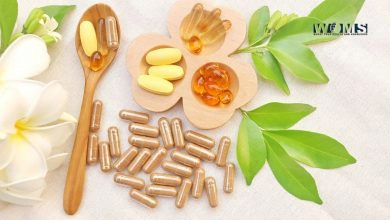6 Best natural antihistamines to combat against your seasonal allergies

As the season changes, there is a high chance of getting seasonal allergies. Seasonal allergies can be troublesome as it shows symptoms like sneezing, itchy eyes, nasal congestion and sinus pressure which are difficult to tolerate. Histamine plays an important role in allergy and knowing natural antihistamines will help you in treating allergy.
To get rid of this trouble you make use many over the counter solutions but you might have hoped if there are any natural solutions to overcome this problem.
Although medications help you with getting rid of these symptoms these medications have their own side effects. If we have some idea about antihistamines we can make great use of natural antihistamine to combat allergy
What is histamine?
Histamine is one of the most widely studied biological amines in medicine. It stimulates smooth muscle contraction and gastric acid secretion, increases vascular permeability, acts as a neurotransmitter, and plays various roles in immunomodulation, allergy, inflammation, haematopoiesis, and cell proliferation.
Histamine exerts its effects through four different receptors included as H1 to H4 which are explained further. H1 and H2 receptors are widely distributed, H3 receptors are predominantly presynaptic, and H4 receptors are predominantly hematopoietic. Meanwhile, an overview of healing histamine is also present in the context.
What is antihistamine?
Antihistamines are drugs that treat allergic rhinitis and other allergies. People commonly take an antihistamine as an inexpensive, generic, over-the-counter medicine that provides relief from nasal congestion, sneezing, or hives caused by pollen, dust mites, or animal allergies.
Antihistamines are usually for short-term treatment. Chronic allergies increase the risk of health problems that antihistamines cannot treat, including asthma, sinusitis, and respiratory tract infections. Consultation of a medical professional is recommended for those who intend to take antihistamines for long term use.
You may sometimes see antihistamine creams as a source of antihistamine. You will get answers to many questions including is coffee an antihistamine. You may have also heard about grape allergy. Is that related to this topic? Does our mast cell stabilize allergies?
How do antihistamines work?
Your allergy is an immune reaction to an otherwise harmless substance. This substance – whether it is pollen, animal dander, or dust – comes into contact with cells in the mucous membranes of your nose, mouth, throat, lungs, stomach, and intestines. In a person with an allergy, it triggers the release of the chemical histamine. Whatever be the source of your antihistamine, be it an antihistamine cream, the working method is something that we consider.
Histamine is a part of the immune system that causes all the symptoms that you associate with allergies – symptoms like sneezing, itching, and a cold that you dislike. Antihistamines block histamine activity, seeking to prevent an allergic reaction.
Many allergy medications work as antihistamines on the shelves of your local drugstore. But there are also some foods and plant extracts that can equally inhibit the effects of histamine.
The 6 best natural antihistamines
1. Apples
Apples are known as one of the best natural antihistamines. Apples are rich in quercetin and flavonoid which is known as a natural antioxidant helps to lessen the respiratory allergies.
Researchers in Crete study found that people whose diets are incorporated with apples had greater protection against asthma and another respiratory allergy.
Quercetin in apples may help to prevent wheezing in adolescence because of its antioxidant properties. It also helps to prevent different types of allergies in pregnant women and children. So you must eat at least an apple a day to keep your doctor away.
2. Berries
Berries are rich in anthocyanins, ellagic acid, and resveratrol which is the great source of antioxidants. These antioxidants may protect your cells from free radical damage.
The antioxidants present in the berries diet has a significant effect on the prophylaxis and progression of various allergy associated with oxidative stress.
Therefore greater attention should be paid on your berry diet to combat with seasonal allergy. The phenolic compounds present in the berries are also known as best natural antihistamines.
3. Black tea
Black tea is rich in Theaflavins which may reduce allergic response in people with sensitive skin and another dermatological allergy.
Chamomile tea and kratom tea is recognized throughout the world as a natural antihistamine. It is said to drink 2 cups of chamomile tea daily in order to get the best natural antihistamines responses. You can add honey as a sweetener in chamomile tea which may provide you immunity towards many common allergens.
4. Broccoli
Broccoli is one of the great sources of vitamin c. Vitamin C is known as the best natural antihistamines to combat against your seasonal allergies. A compound known as Telfair can upset the histamine pathway which is present in broccoli.
There are other foods like bell peppers, cantaloupe, cauliflower, citrus fruits, kiwifruits, tomato and tomato juices acts as best natural antihistamines.
5. Grapes
Researchers said that adding quercetin in the diet help to relieve allergy symptoms. Grapes are also rich in quercetin which is known as the best natural antihistamines. Quercetin has both anti-allergic and antihistamines properties.
Quercetin in grapes mainly helps to prevent respiratory allergies.
Quercetin is naturally present in many foods and herbs including:
- Buckwheat tea
- Ginkgo biloba
- Peppers
- Red onions
- Red wines
These foods also work as the best natural antihistamines.
Alternative allergy treatments
If natural antihistamines do not reduce a person’s allergy symptoms, they may need to seek pharmacological treatment or non-pharmacological treatments.
Other non-pharmacological methods to treat and prevent allergy symptoms include:
- Avoiding allergens
The more common allergens are:
- Grass and tree pollen: These allergens cause allergic rhinitis
- Dust mites
- Animal dander
- Foods which may causes allergy are nuts, fruits, shellfish, eggs and cows milk
- Insect bites: read more about the spider bites symptoms
- Wear a medical alert bracelet
- Know what to do during an allergic reaction
- Manage stress
- Detoxify the body
- Try acupuncture
Other Pharmacologicalmethods to treat and prevent allergy symptoms include:
First-generation: having sedative action
- Promethazine
- Chlorpheniramine maleate
- Pheniramine maleate
- Ketotifen
- Diphenhydramine
- Cyproheptadine
- Cyclizine/meclizine
- Hydroxyzine
- Mebhydrolin
Second generation: Non-sedative
- Loratadine
- Desloratadine
- Fexofenadine
- Terfenadine
- Mizolastine
- Levocetirizine
- Cetirizine hydrochloride
- Ebastine
- Rupatadine
Disclaimer: only use these medicines with the doctor advice.
The pharmacological action of H1 antihistamine:
- Antiallergic action
- Sedative action
- Antiemetic action
- Antiparkisonism action
- Alfa blocking action: hypotension
- Serotonin blocking action: weight gain.
Summary
Over- the counter antihistamines can be a lifesaver but have multiple side effects. Some of the side effects of the over-the-counter antihistamines are drowsiness, dry mouth, blurred vision and difficulty peeing.
For this reason, many people are choosing natural antihistamines to combat their allergies.




